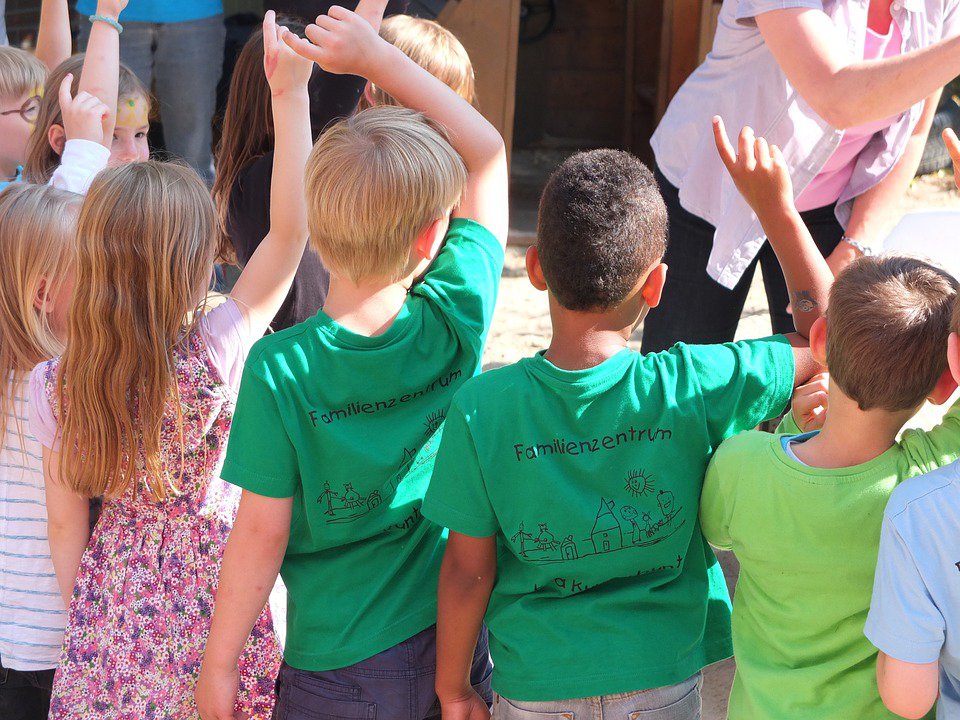
As the Director of Human Resources for RoboSource, I notice things about the employees I hire. Sure, the leaders in production and finance will have ideas about how well employees are performing technically or financially. But I notice their citizenship. Basically, how well they do the things they should have learned in kindergarten? I notice if they bring people up or down. I notice if they take the time to do the dirty jobs. I notice it all.
And let me tell you, I look for it. When I’m interviewing for a new hire, I think about whether this person will think him/herself above doing things like emptying the trash. Whether they are an includer or are likely to be cliquey. Whether they would delay heading home from work because a co-worker has a dead car battery and needs a jump.
I’m basically on the lookout (constantly) for really solid, good people. RoboSource is full of them. It’s important to our culture, and it’s important to who we are. Because who would you rather work with—someone who gossips or someone who invites you to lunch? It’s an easy answer.
So here they are: 10 things you learned in kindergarten that make you a better employee today. And a short story about one of our employees who exemplifies that trait (another thing we learned in kindergarten: story time is the best time).
1. Clean up your own messes.
 It’s one of the first things you learn in kindergarten: when you finish with your toys, put them away. If you spill milk, clean it up. Of course, as adults, we generally clean up after ourselves after we eat lunch. But how about after we host a meeting in the conference room? It’s so great to come into the room for a meeting and have all the chairs pushed in and the table cleared.
It’s one of the first things you learn in kindergarten: when you finish with your toys, put them away. If you spill milk, clean it up. Of course, as adults, we generally clean up after ourselves after we eat lunch. But how about after we host a meeting in the conference room? It’s so great to come into the room for a meeting and have all the chairs pushed in and the table cleared.
Or you can take this even further. It’s inevitable—we all make messes sometimes. But when you really mess up a project, what’s your first reaction? To clean it up, or to find someone to blame? The best employees are always those willing to clean up their own messes.
We have this one GREAT employee. He’s had the unfortunate honor of heading up this really messy project. The project in itself is pretty great—fun technology, an exciting company. But it’s just one of those projects where EVERYTHING goes wrong. All the time. If some weird thing is going to happen, it’ll happen with this project. No question. The project uses an enormous amount of data, and data has a tendency to get really messy. This employee is always willing to clean up that mess (even when it’s often not his fault) and get going again. He’s just that kind of person. You can call him many things, but “complainer” isn’t one of them.
2. Sharing is caring.
 It’s really something you learn way before kindergarten, but sometimes the lesson gets tested mightily in that first year of full-time school. If you are coloring a picture and you aren’t using the red right now, you have to let someone else use it (even if you’re really sure you are going to need it again soon).
It’s really something you learn way before kindergarten, but sometimes the lesson gets tested mightily in that first year of full-time school. If you are coloring a picture and you aren’t using the red right now, you have to let someone else use it (even if you’re really sure you are going to need it again soon).
The same applies to the workplace. If you like to bake, bring in a batch of cookies to share with everyone. Occasionally, bring in a batch of donuts—just for fun! If you have six pens and your co-worker can’t find one, give her one of yours! Don’t hoard them!
We have this young, single employee who lives alone. This guy is really enjoying learning to cook. He’s also an epic share-er. Just a few weeks ago, he came into the office with two plastic containers full of popcorn to share with his co-workers. The funny thing about this was that one was labeled “popcorn” and one was labeled “gross popcorn.” We asked him why the second container was labeled “gross.” I mean, no one is going to eat something labeled “gross,” right? “Well,” he responded, “they might. They might like their popcorn saltier than I do. It just has too much salt.” We got him to change the label to “very salty popcorn” (though he added “eat at your own risk”). At least the co-workers could decide if they wanted to try super-salty popcorn, instead of thinking it had been dropped on the floor. Either way, he’s a great share-er. He even shares his mistakes!
3. Talk less. Listen more.
 We’ve all been in class with the kid who can’t shut up. The teacher asks a question and his hand is waving in the air, and he’s saying, “Ooh, ooh, ooh!” Sometimes when the teacher calls on him, he has no idea what the question was. He just wants to hear himself talk.
We’ve all been in class with the kid who can’t shut up. The teacher asks a question and his hand is waving in the air, and he’s saying, “Ooh, ooh, ooh!” Sometimes when the teacher calls on him, he has no idea what the question was. He just wants to hear himself talk.
Unfortunately, we’ve all been in meetings like that, too. Sometimes it’s hard to get a word at all. And some people will never stop to listen to what you have to say, even when you do get to talk. They are too busy formulating their next idea or comment.
At RoboSource, we work with students and a lot of very young adults. It’s a large part of what we do. And when young adults come into an office, one of two things usually happens. One, they compensate for lack of experience by acting like they know everything. Or two, they sit in meetings and never open their mouths. We have a current apprentice who was pretty quiet in the office. In meetings, he didn’t say much. We spent much of the summer trying to draw him out. He took a lot in and worked hard. When the full-time employee on his project was out for the day that a client needed a last-minute demo, though, his summer of listening paid off. He jumped at the opportunity and presented himself to the client as a mature adult. And he did an incredible job at the demo. He presented the software at a slow pace, explaining where necessary, and listening to questions carefully before answering. He rocked it. Being a great listener made him a great employee.
4. Take time for a break.
 In kindergarten, recess is just the best thing ever. You can’t wait for the chance to run and play and laugh and just YELL. Sitting still all day is difficult. Teachers know the secret—if the kids get squirrelly, take them outside for awhile. Five-year-olds can only sit still for so long.
In kindergarten, recess is just the best thing ever. You can’t wait for the chance to run and play and laugh and just YELL. Sitting still all day is difficult. Teachers know the secret—if the kids get squirrelly, take them outside for awhile. Five-year-olds can only sit still for so long.
Breaks are important at work, too, whether it’s a quick walk to get the blood moving or a week of vacation to get away from all of it. Everyone thinks better after a break. If something makes you really angry, nothing will serve you better than to take a quick break. It’s so easy to say something you’ll regret or loose control of your emotions. Taking a quick break is never inappropriate.
We have another super young employee who is single and lives alone. He never uses Paid Time Off days. I told him he needed to take some vacation time. He said he didn’t know what he’d do with a week at home. After some sound advice from a co-worker, he came up with the idea of taking Mondays off. For most of the summer, he had three-day weekends to rest and get rejuvenated. Even though I was proud of the way he found a way to take a break, I’m still bugging him about a taking a longer period of rest at some point.
5. Practice good hygiene.
 Yes, we learn in kindergarten about getting ourselves clean. And brushing our teeth. And changing clothes. And washing, washing, washing our hands.
Yes, we learn in kindergarten about getting ourselves clean. And brushing our teeth. And changing clothes. And washing, washing, washing our hands.
Most adults have nailed this one. But sometimes young adults (or not-so-young ones) have not. Sometimes, we forget to do the smell test. (My advice? Ask a close friend or family member to tell you the truth: do you ever smell?) If that’s an issue, keep some deodorant in your desk drawer. If chronic bad breath is a problem (again, ask a friend), keep mints or gum on hand. Sometimes we are running late and don’t take time to shower or brush our hair. It seems silly, but I’d never hire an employee that noticeably smells. Neither would most people. So this silly little thing is actually really important.
Since we work with youth, things like this come up occasionally. One of our company leaders is a mom to teens. So she has a lot of experience in this area. (“Go shower. Now.”) Every year, during our apprentice training days, she gives a short lecture on our expected hygiene standards. These are the very basics: shower. Wash your clothes. Throw away that really old banana peel you’ve left on your desk. Again, it seems silly, but you’d be surprised how often we run into it. And addressing it head-on works.
6. Never leave people out.
 In kindergarten, we aren’t allowed to leave anyone out. We are taught to include everyone—even the kid that picks his nose. If only we remembered this lesson as we headed into middle school and high school…
In kindergarten, we aren’t allowed to leave anyone out. We are taught to include everyone—even the kid that picks his nose. If only we remembered this lesson as we headed into middle school and high school…
I’ll tell you, this is something I LOOK for when hiring an employee. I want someone who will draw people in instead of pushing them away. Today, culture is one of the top things people look for in a company. And to have a good company culture, you have to be inclusive. You have to fight having an “in-group.” (I know, it sounds childish, but it’s there. If you think I’m crazy, you’re likely not the person on the outside of the group.) I want someone who is interested in others and genuinely cares about them, rather than the person that is looking for the best connections.
It all comes down to trust.
One of our employees suggested starting a “Monday Lunchday.” Many of our employees are frugal and generally save money by bringing a lunch from home. He suggested that we start eating out together on Mondays. It quickly became a thing. My favorite thing about Monday Lunchday? Everyone is welcome. Even though other groups would likely be happy to have others join them when they head out on other days, I think it’s hard to put yourself out there and invite yourself. On Monday Lunchday, everyone is invited and everyone gets to vote on where the group will go. The same employee that started Monday Lunchday has continued to champion the weekly event. He makes sure everyone feels invited. And it’s great to have one day set aside to just talk casually with other employees.
7. Confidence is key.
 A large part of a kindergarten teacher’s job is to increase the confidence of his/her little students. To help them believe they can recognize words and letters. To help them believe they can count. To help them learn to use their voice in appropriate ways, to speak for themselves, and to ask for what they need.
A large part of a kindergarten teacher’s job is to increase the confidence of his/her little students. To help them believe they can recognize words and letters. To help them believe they can count. To help them learn to use their voice in appropriate ways, to speak for themselves, and to ask for what they need.
Working with a lot of young employees isn’t very different. In fact, it hasn’t been a lot different for me, either. I spent the first 15 years of my career in journalism, nonprofit, and education. When RoboSource grew and I started working with the company full-time, I really hadn’t ever been in the world of business. Networking events were exhausting and intimidating for me. I was suddenly pulled out of a world where my master’s degree was important. Now accomplishments were important. I needed a big boost of confidence to get to the next level. Sometimes, I still do.
Our young employees do, too. They need to be told how smart they are (it’s not a stretch of the truth at all—they are brilliant). They need to be encouraged. And when they inevitably mess up, it needs to be dealt with carefully.
It’s been fun watching one of our apprentices grow in confidence. A first generation college student, he was SO excited about RoboSource when he met us at a job fair. He soared through the interview process and started with us in the spring. He came in with the will to get everything he could out of the experience. He worked hard, asked the right questions, and became increasingly likely to speak up with answers to questions. By the end of the summer, he was a natural choice for one of our leadership positions. He carries himself with confidence and our other student workers look up to him. It’s been great to watch his confidence grow.
8. Never stop learning.
 In kindergarten, you are just learning how to learn. And there is SO MUCH to learn. You quickly realize how far behind you are, how much the older kids know, how far there is to go. The hope is that this is inspiring, instead of overwhelming.
In kindergarten, you are just learning how to learn. And there is SO MUCH to learn. You quickly realize how far behind you are, how much the older kids know, how far there is to go. The hope is that this is inspiring, instead of overwhelming.
Lifelong learning is a great trait. Some people have it naturally. And some of us have to force it a little bit. Some of us settle into our careers and just keep coming to work each day and doing what we do. And some of us are inspired to do it better. We read books and listen to podcasts and sometimes spend our free time attending lectures or conferences. Employees that love to learn are absolutely invaluable. I love, love, love the employees that come to company leaders and say, “There’s an idea I’ve been researching…” I’ll fight to keep those people around.
About six months ago, we decided that I needed an assistant. I contacted a few people for recommendations. I got the word out. And then I thought about my college teaching days. And there was this one student who I remembered. I remembered her because she loved to learn. She actually paid attention in class and asked questions. She worked hard. She got so much joy from learning. Several years after she graduated, I found her and hired her. It’s been a great success, because that love of learning has carried through. The words, “I wonder if we could…” are barely out of my mouth before she’s researching it and figuring out how to do it. Not knowing how to do something doesn’t even slow her down. She’s a learner, and it’s so refreshing to this I-don’t-want-to-learn-something-new-but-I-guess-I’ll-force-myself person.
9. Dress to impress.
 When you start school, you quickly realize that it’s important to tie your shoes. And that if everyone else has Crocs, you might want them too. And if everyone else is wearing pretty dresses, just maybe, you should do the same. You start to care, just a little bit.
When you start school, you quickly realize that it’s important to tie your shoes. And that if everyone else has Crocs, you might want them too. And if everyone else is wearing pretty dresses, just maybe, you should do the same. You start to care, just a little bit.
We work in a very casual industry. We don’t have a dress code at RoboSource. It’s not unusual to see flip-flops or hoodies or t-shirts and cargo shorts. We dress for comfort. We’ve quickly learned that the rest of the world doesn’t operate the same way. Day at the office? Be comfortable. Heading to a networking event or client meeting? Take more care. Two principles here:
One: it’s always better to be overdressed than underdressed.
Two: when you feel like you look good, you act more confident.
We have this employee who has been with us for just about a year. He came from a finance background. And even though I told him there wasn’t a dress code, during his first several months with us, starched pants and button downs were the norm. Very, very slowly, he started to morph into our culture. One day, he switched to jeans with the button down. Another day, we noticed the migration from shiny dress shoes to sneakers. Now, the transformation is complete, and he’ll often show up to the office in a t-shirt (sometimes even untucked!) and shorts. But let me tell you, he remembers how to dress to impress. If there’s a hint of a client meeting coming, back out come the impressive clothes. One day, a meeting came up last minute. He was dressed in a somewhat “RoboSource-y” outfit. Even though he was told that he was okay as he was, he quickly left to change. He knew he wouldn’t feel as confident in the meeting unless he was dressed to impress.
That’s it! Nine things you learned in kindergarten that make you a better employee. Sometimes a refresher of those early days is exactly what we need.

Recent Comments